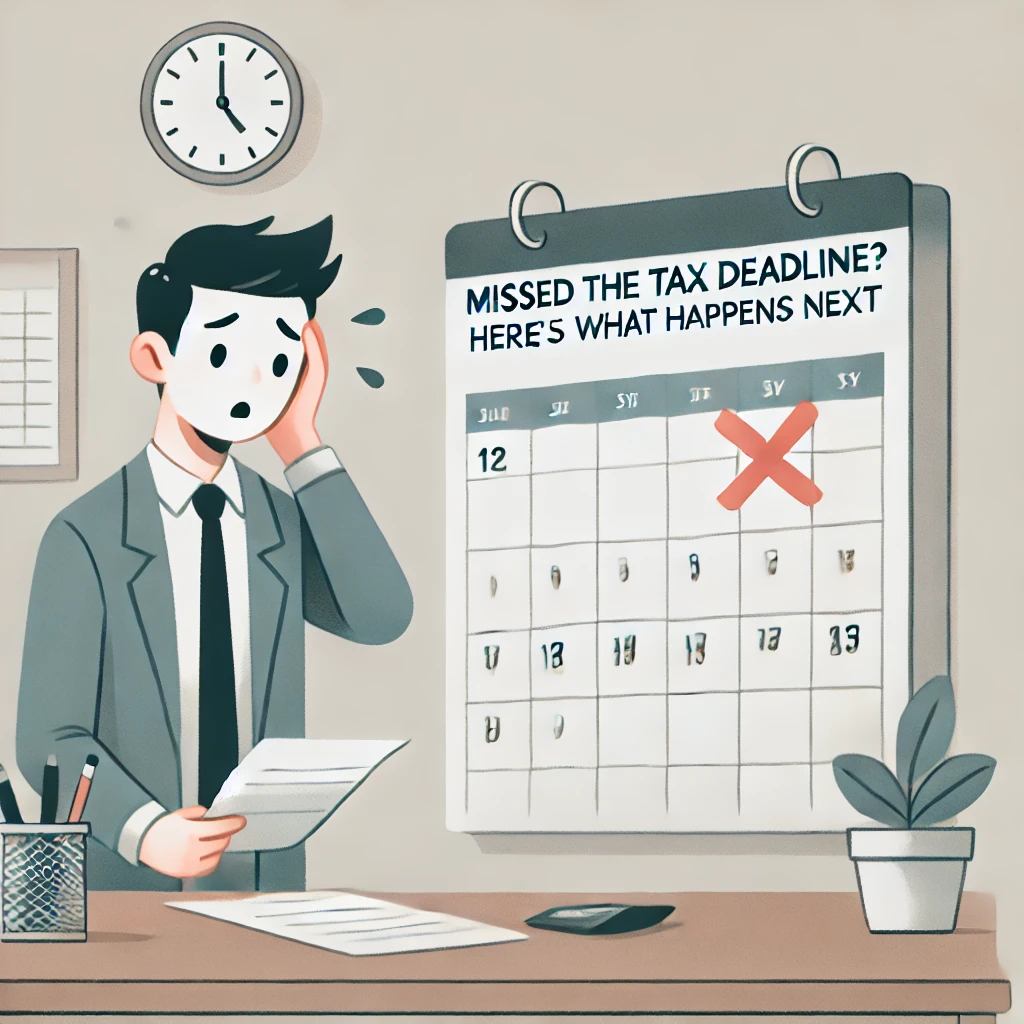
Set Appointment

Missing the tax deadline as a business can lead to several challenges, from financial penalties to potential complications with the IRS. When a business fails to file taxes on time, it may face late filing and late payment penalties, which can accumulate and impact the company’s bottom line. Beyond financial costs, missing the deadline can also disrupt cash flow, complicate future tax planning, and lead to increased scrutiny from tax authorities. However, understanding the consequences and available options—such as requesting an extension or setting up a payment plan—can help mitigate these effects and keep your business on track.


If you miss the tax deadline, the first consequence is usually a late filing penalty. The penalty amount typically depends on how late you are and the total amount of tax owed. For businesses, these penalties can add up quickly, impacting your cash flow. Generally, the penalty is a percentage of the unpaid taxes and increases over time. The longer you wait, the higher the penalty. This can create a significant financial burden, especially for small businesses that might already be struggling with cash flow issues.
In some jurisdictions, the penalty for late filing can be as high as 5% of the unpaid tax amount for each month that the return is late, up to a maximum of 25%. It's important to understand the specific penalty structure in your area to fully grasp the potential financial consequences of missing the tax deadline.
In addition to penalties, interest begins to accrue on any unpaid taxes from the day after the due date. This means that even if you are only a few days late, you could end up owing significantly more due to compounding interest charges. Interest rates are typically set by tax authorities and can vary, but they are often calculated on a daily basis, which means the amount you owe can grow quickly if left unpaid.

Interest charges are separate from penalties, and both will continue to accumulate until the full tax amount, including penalties and interest, is paid off. This can result in a snowball effect, where the longer you delay payment, the more difficult it becomes to settle your debt. For businesses already facing financial challenges, these additional costs can exacerbate cash flow problems and hinder growth.
Missing the tax deadline can also result in losing out on certain tax benefits. For example, you may no longer qualify for deductions or credits that require timely filing, which could increase your tax liability. Many tax deductions and credits have strict deadlines, and failing to file on time may mean you miss out on these opportunities, leading to a higher overall tax bill.
For instance, certain credits for small businesses, such as research and development credits or energy efficiency incentives, may only be available if the tax return is filed by the original deadline. Missing out on these benefits can result in a significant financial disadvantage, as these credits are designed to help reduce the tax burden and support business growth.
Repeatedly failing to meet tax deadlines or owing a significant amount can lead to legal action from tax authorities. This may involve levies on business assets or other enforcement actions to recover unpaid taxes. In severe cases, tax authorities may place a lien on your business assets, which gives them a legal claim to your property until the debt is paid. This can make it difficult to sell assets or secure financing.
In some cases, persistent non-compliance can lead to criminal charges, especially if tax authorities believe there is willful evasion. This could result in fines or even imprisonment for responsible parties within the business. It's crucial to understand that tax authorities have broad powers to enforce tax laws, and ignoring tax obligations can lead to severe consequences that go beyond financial penalties.
Failing to pay taxes on time could also damage your business reputation. Suppliers, customers, or even lenders might view your business as financially unstable, which can affect future business opportunities. A history of late tax payments can make it harder to secure credit or negotiate favorable terms with suppliers, as they may perceive your business as a higher risk.
For businesses that rely on partnerships or government contracts, a poor tax compliance record could lead to disqualification from bidding on projects or loss of existing contracts. Maintaining a good reputation is essential for business growth, and consistently missing tax deadlines can undermine the trust that stakeholders have in your business.
If you realize you've missed the tax deadline, it's important to act quickly. File your taxes as soon as possible to minimize penalties and interest. The sooner you file, the less you will owe in penalties and interest. You may also contact the tax authority to discuss payment plans if you are unable to pay the full amount immediately. Many tax authorities offer installment agreements or other relief options for businesses that are struggling to pay their tax bills.
If you're unable to pay the entire amount due, it's still better to file your return and pay as much as you can. Partial payments can help reduce the amount of interest and penalties that will accrue. Additionally, consider seeking the help of a tax professional who can provide guidance on your options and help you negotiate with tax authorities if needed.
Another step to consider is applying for penalty abatement. In some cases, tax authorities may waive penalties if you can demonstrate reasonable cause for missing the deadline, such as unexpected financial hardship or natural disasters. While interest charges are less likely to be waived, reducing penalties can still provide significant relief.
Lastly, take steps to ensure you don't miss future deadlines. Set reminders, work with a tax advisor, or use accounting software to help keep your tax obligations on track. Developing a proactive approach to tax compliance can help you avoid the stress and financial burden associated with late filing and payment.
How much business tax will i pay